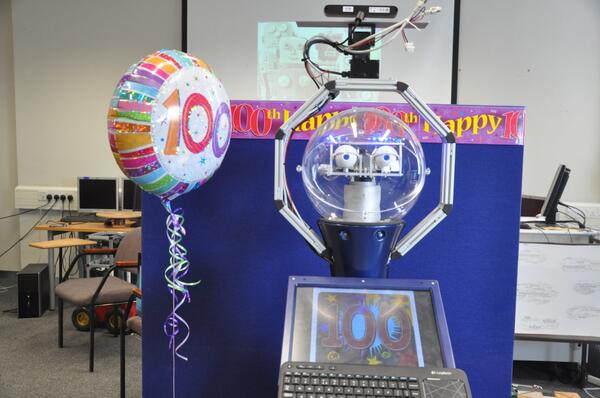Our work on long-term robotics localisation is featured in this year’s AAAI video competition. There’s a public vote via YouTube likes, so any “likes” on the YouTube video are much appreciated.
Our work on long-term robotics localisation is featured in this year’s AAAI video competition. There’s a public vote via YouTube likes, so any “likes” on the YouTube video are much appreciated.
Members of the public will have the opportunity to meet Linda the robot at a week-long celebration of university research at the Natural History Museum in London.

Linda is a specialist mobile robot currently being programmed to act intelligently in real-world environments, with the ultimate aim of being able to support security guards or staff in care homes.
She is one of six robots involved in the £7.2 million collaborative STRANDS project aimed at creating mobile robots that are able to operate independently, based on an understanding of 3D space and how this space changes over time.
Linda, who is based at the University of Lincoln, UK, and named after the city’s Roman roots as Lindum Colonia, will be mingling with visitors to the Museum from 9th to 13th June in the ‘Robots on Patrol’ exhibit.
The event is part of Universities Week 2014 which aims to increase public awareness of the wide and varied role of the UK’s universities.
It will be an opportunity for the research team to showcase the robot, which has already learned to map a building and run for 30 days autonomously.
Funded by the European Union’s Seventh Framework programme (FP7), the research project involves six academic partners, a security company and an Austrian care home provider, where the technology will be tested.
The robots will eventually be deployed to run for an extended time so they have the chance to develop an understanding of how the world should appear and be able to identify deviations from their normal environment.
Dr Marc Hanheide, from the University of Lincoln’s School of Computer Science, will be on hand throughout the week to explain Linda’s capabilities.
He said: “The aim is to show members of the public how this sort of technology could help us in our everyday lives, assisting humans in basic activities allowing them to concentrate on more important aspects of their work.
“It’s not just about providing a care home or security robot. We are trying to enable robots to learn from their long-term experience and their perception of how the environment unfolds in time. It will have many possible applications and taking Linda to the Natural History Museum is a fantastic opportunity for people to see how robots like this will, one day, be able to aid and assist humans in a variety of roles.”
The exhibit is just one of a number being hosted by the Natural History Museum as part of Universities Week 2014.
Watch the video here: https://www.youtube.com/watch?v=67ul8Ix8ehs
L-CAS is offering another fully-funded PhD opportunity in the STRANDS project. 
Researchers of L-CAS are studying how mobile robots can learn from long-term experience to provide service in security and care scenarios. As part of the European STRANDS project, they contribute to the development of robots that are able to operate autonomously, without the need of human intervention, in regular indoor environments like offices and homes over long periods of time.
The 4 year project involving six academic partners from Lincoln, Birmingham, Leeds, Vienna, Aachen, and Stockholm has started in April this year. The EU robotics week is the project’s first major milestone to show their robots working continously and autonomously at the different sites. Lincoln’s robot “Linda” is patrolling its surrounding 24/7 during this week as part of the “STRANDS robot marathon”.
 Linda faces the challenge to safely and reliably navigate an environment that is populated by people and not customised to a robot’s needs. She will have to cope with changes that occur, such as lights being turned on and off, objects moved about, and people walking around. During the whole week Linda will be streaming live to the internet where the public can follow Linda on her patrol routes every day and night. Linda can be seen patrolling, charging autonomously, and visiting checkpoints that have been defined by the researchers. While this is the first step towards autonomous robots that can assist and help people, the STRANDS project ultimately aims to deploy robots like Linda to other sites where they will complement human guards to increase security and help staff in care facilities, facilitated by the project partners G4S and AAF, respectively.
Linda faces the challenge to safely and reliably navigate an environment that is populated by people and not customised to a robot’s needs. She will have to cope with changes that occur, such as lights being turned on and off, objects moved about, and people walking around. During the whole week Linda will be streaming live to the internet where the public can follow Linda on her patrol routes every day and night. Linda can be seen patrolling, charging autonomously, and visiting checkpoints that have been defined by the researchers. While this is the first step towards autonomous robots that can assist and help people, the STRANDS project ultimately aims to deploy robots like Linda to other sites where they will complement human guards to increase security and help staff in care facilities, facilitated by the project partners G4S and AAF, respectively.
Follow Linda live on the internet.
Linda, L-CAS’s mobile robot developed in the STRANDS project, will soon be reaching a first major project milestone: Running autonomously for a total of 30 days. While this seems easy too achieve for today’s industrial robots, Linda has continuously been patrolling an office space at the School of Computer Science University of Lincoln which is not designed to accommodate a robot. The challenges Linda faced when she was on duty for 24/7 for a whole month were changing lighting conditions, re-arrangement of furniture, and blockage of her way. During this time Linda travelled more than a 100km.


And here is Linda’s tweet when she accomplished the milestone: